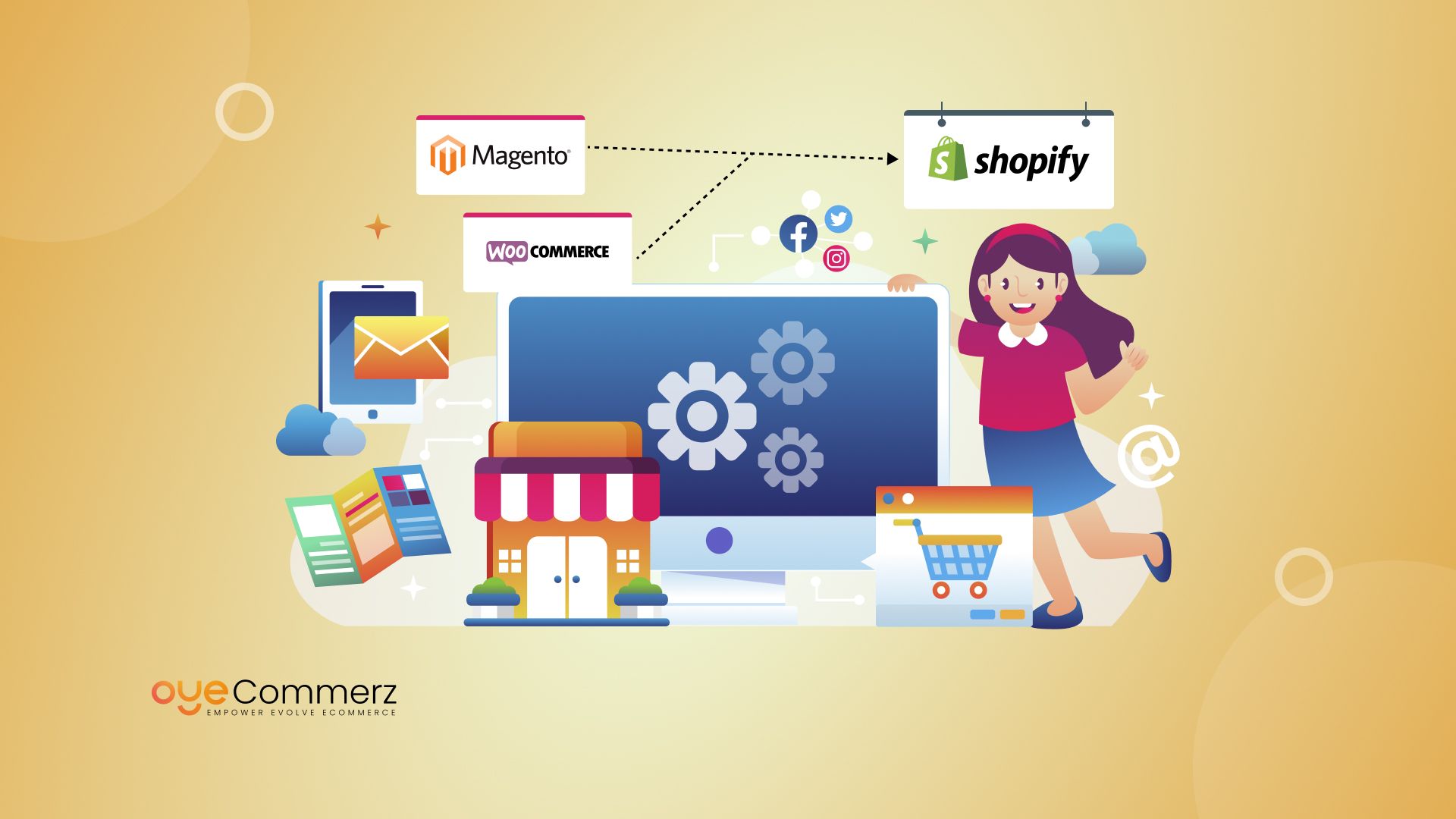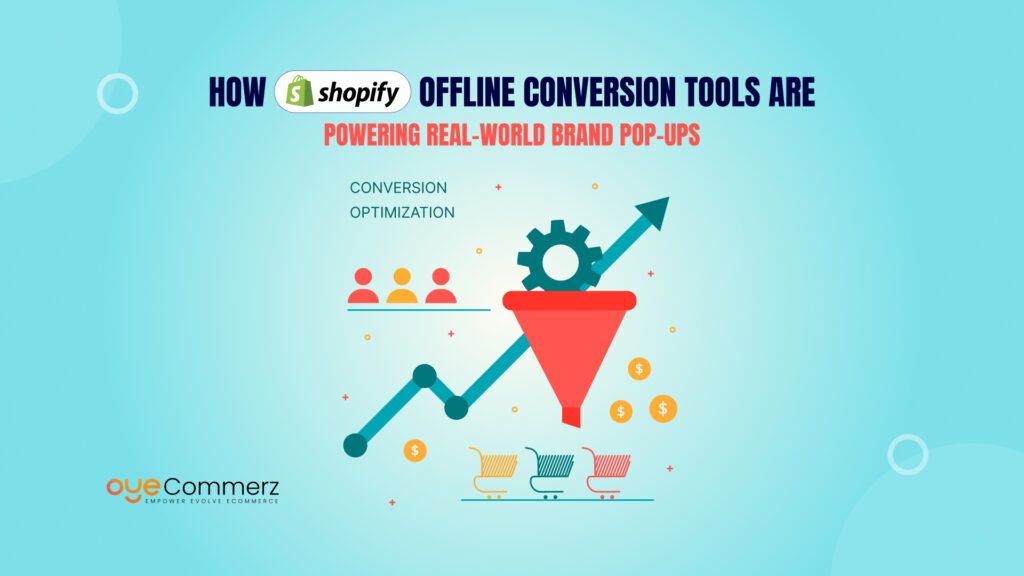Have you ever felt stuck with an eCommerce migration platform that’s too rigid, too expensive, or simply not built for Shopify Composable Commerce the fast-moving digital world? If so, you’re not alone. In fact, over 60% of businesses that migrate from Magento and BigCommerce do so to improve flexibility, reduce costs, and scale faster.
For existing Shopify business owners and brands considering a switch, the future of eCommerce isn’t about being locked into an outdated, one-size-fits-all system. It’s about a modular, API-driven approach that gives you the freedom to build your store exactly the way you want, integrating best-in-class tools for checkout, personalization, marketing, and app development.
In this blog, we’ll break down why brands are moving away from monolithic platforms like Magento and BigCommerce and how Shopify Composable Commerce is redefining the way businesses grow online.
Table of Contents
ToggleUnderstanding Monolithic vs. Composable Commerce
In today’s fast-evolving digital landscape, brands need eCommerce solutions that are agile, scalable, and future-proof. Traditional platforms like Magento and BigCommerce follow a monolithic architecture, limiting flexibility and innovation. This is where Shopify Composable Commerce is transforming the game, offering brands the ability to build highly customized online stores with modular, best-in-class solutions.
What is Monolithic Commerce?
Monolithic commerce refers to an all-in-one eCommerce system where the frontend (storefront) and backend (database, checkout, inventory) are tightly integrated. Platforms like Magento and BigCommerce use this model, providing a unified ecosystem for store owners. However, while this may seem convenient, it often creates challenges such as:
- Rigid Structure – Customizations require complex coding and development work.
- Longer Development Cycles – Rolling out new features or integrations can be time-consuming.
- High Maintenance Costs – Brands need dedicated developers for updates, security patches, and optimization.
- Scalability Issues – Scaling a monolithic platform can be resource-intensive, requiring additional hosting, infrastructure, and maintenance.
What is Shopify Composable Commerce?
Shopify Composable Commerce is a modern approach to eCommerce that allows brands to build their online store using modular components. Unlike traditional monolithic platforms, Shopify enables businesses to integrate independent best-in-class solutions (e.g., headless CMS, payment gateways, checkout systems, AI-powered search, and third-party apps) that work seamlessly together.
Key Benefits of Shopify Composable Commerce
- Flexibility & Customization – Brands can choose and integrate only the solutions they need, creating a tailored experience.
- Faster Innovation – New features and updates can be rolled out without disrupting the entire system.
- Scalability & Performance – Shopify’s cloud-based infrastructure ensures seamless scaling during high-traffic periods.
- Cost Efficiency – Reduces the need for heavy custom development, lowering long-term operational costs.
- Future-Proofing Your Store – Easily adapt to new technologies and market trends without overhauling your entire platform.
Why Shopify Composable Commerce is the Future
As brands look to optimize their eCommerce experience, Shopify Composable Commerce stands out as the ideal solution for businesses that want agility, scalability, and superior customer experiences. By breaking free from the constraints of monolithic platforms, brands can focus on growth, innovation, and delivering seamless shopping experiences without technical roadblocks.
Why Brands Are Moving Away from Magento & BigCommerce
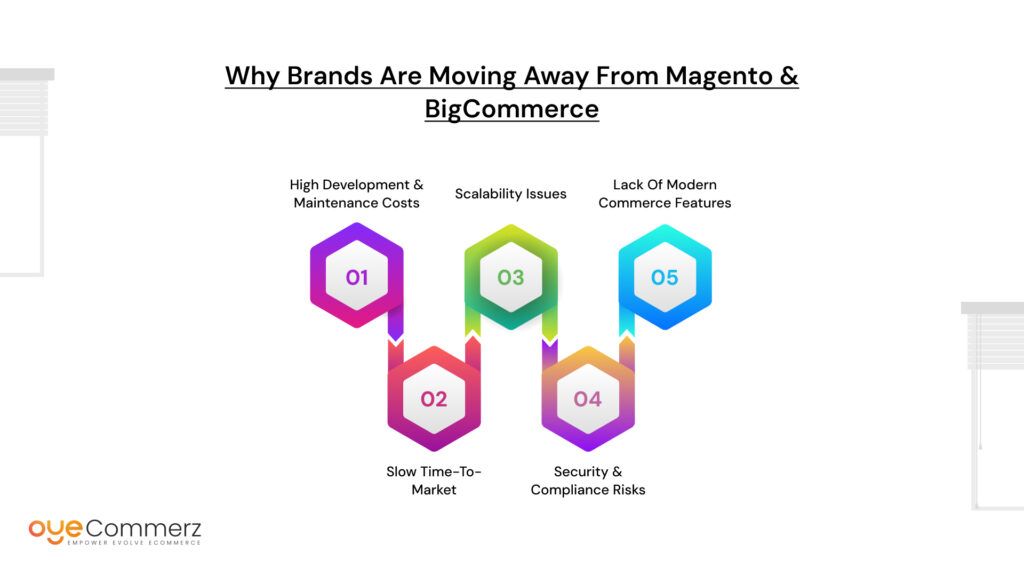
As the eCommerce industry evolves, brands are increasingly realizing the limitations of traditional platforms like Magento and BigCommerce. These monolithic platforms, while once industry leaders, struggle to keep up with modern commerce demands, especially in terms of flexibility, scalability, and cost efficiency. This is why many businesses are shifting to Shopify Composable Commerce, which provides a future-ready, modular approach to online retail.
Challenges of Magento & BigCommerce
Despite their widespread use, Magento and BigCommerce come with several challenges that make them less appealing for modern brands:
1. High Development & Maintenance Costs
- Magento requires a dedicated team of developers for maintenance, updates, and customizations, making it an expensive platform to operate.
- BigCommerce, while slightly more user-friendly, still demands technical expertise for custom functionalities.
- Shopify Composable Commerce eliminates these costs by offering a low-code/no-code environment, allowing brands to build and scale efficiently.
2. Slow Time-to-Market
- Magento stores often require months to set up due to complex configurations.
- BigCommerce users may struggle with limited built-in features, leading to lengthy integration processes.
- With Shopify Composable Commerce, businesses can launch quickly with pre-built integrations and scalable tools.
3. Scalability Issues
- As businesses grow, Magento demands more server resources, driving up infrastructure costs.
- BigCommerce’s scalability options often require expensive enterprise plans.
- Shopify Composable Commerce leverages Shopify’s cloud-based infrastructure, ensuring effortless scaling without backend headaches.
4. Security & Compliance Risks
- Magento users must handle their own security patches, PCI compliance, and software updates.
- BigCommerce, while more secure, still requires manual security configurations.
- Shopify Composable Commerce comes with built-in security, PCI compliance, and automatic updates, reducing the risk of cyber threats.
5. Lack of Modern Commerce Features
- Magento and BigCommerce rely on outdated architectures that struggle to integrate with modern tools like AI-driven personalization, dynamic pricing, and real-time analytics.
- Shopify Composable Commerce is designed to work seamlessly with cutting-edge technologies, enabling brands to stay ahead of the competition.
Why Businesses Prefer Shopify Composable Commerce
Leading brands are switching to Shopify Composable Commerce because it provides:
Modular Flexibility – Pick and integrate only the tools your business needs.
Seamless Integrations – Connect with advanced third-party apps, AI, and automation tools effortlessly.
Lower Costs – Reduce development, maintenance, and operational expenses.
Faster Growth – Quickly scale without worrying about technical constraints.
Many successful brands have already migrated to Shopify Composable Commerce, benefiting from improved performance, lower costs, and faster deployment times. Whether you’re running a fashion brand, electronics store, or subscription-based business, Shopify’s modular architecture empowers you to build the perfect eCommerce ecosystem.
How OyeCommerz Helps You Transition to Shopify Composable Commerce
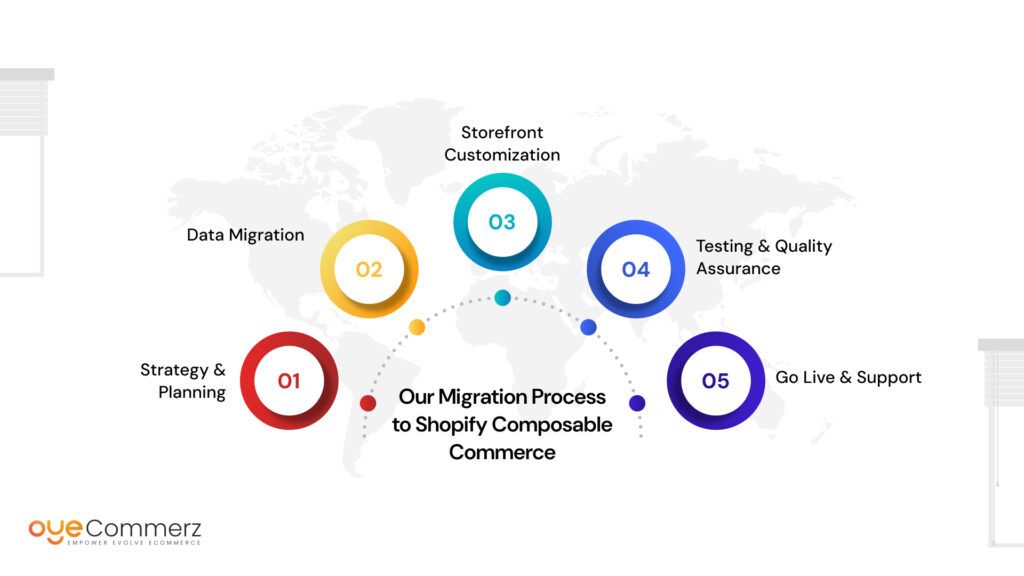
Migrating from Magento or BigCommerce to Shopify Composable Commerce may seem like a complex process, but with the right strategy and expertise, it can be seamless and highly rewarding. OyeCommerz specializes in helping businesses transition to Shopify with minimal downtime, ensuring a smooth shift to a more flexible and scalable eCommerce solution.
Why Choose OyeCommerz for Your Migration?
With years of expertise in Shopify migrations, OyeCommerz offers:
End-to-End Migration Services – From data transfer to storefront customization, we handle it all.
Zero Data Loss – We ensure a secure transfer of products, customer data, orders, and SEO settings.
Minimal Downtime – Keep your business running smoothly with a fast, efficient migration.
Customization & Optimization – Tailor your Shopify store with the right features, themes, and third-party integrations.
Ongoing Support – Post-migration assistance to fine-tune your Shopify store and maximize performance.
Our Migration Process to Shopify Composable Commerce
Step 1: Strategy & Planning
- We analyze your existing Magento or BigCommerce store and identify migration challenges.
- A detailed Shopify Composable Commerce roadmap is created based on your business needs.
Step 2: Data Migration
- Secure transfer of product catalogs, customer data, order history, and site content.
- Preservation of SEO settings, including URLs, metadata, and redirects, to maintain search rankings.
Step 3: Storefront Customization
- Implement a Shopify Composable Commerce setup with modular integrations for payments, checkout, and personalization tools.
- Optimize themes for mobile-first, high-conversion experiences.
Step 4: Testing & Quality Assurance
- Extensive testing to ensure site speed, functionality, and seamless integrations.
- Security audits and performance optimization before launch.
Step 5: Go Live & Support
- Smooth transition with minimal disruptions to your online store.
- Post-migration support for fine-tuning, troubleshooting, and future optimizations.
Magento vs. BigCommerce vs. Shopify Composable Commerce: A Detailed Comparison
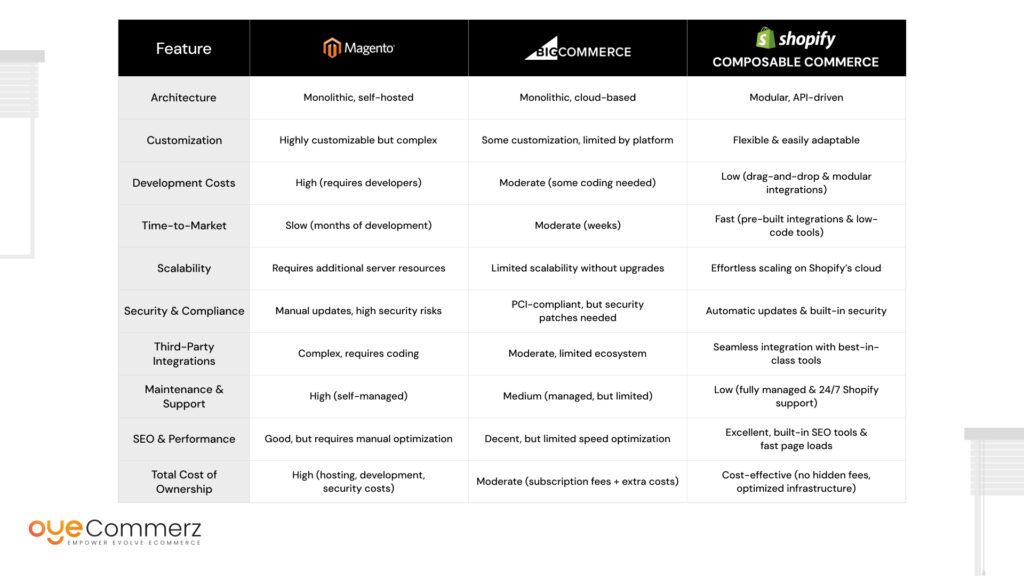
When choosing an eCommerce platform, businesses must consider factors like flexibility, cost, scalability, and ease of use. While Magento and BigCommerce have long been popular choices, Shopify Composable Commerce is rapidly emerging as the go-to solution for brands looking for a modular, future-proof approach. Below, we compare these platforms across key performance areas to help you make an informed decision.
Why Shopify Composable Commerce Outperforms Magento & BigCommerce
- Modular Flexibility – Unlike rigid monolithic platforms, Shopify Composable Commerce allows businesses to choose and integrate only the tools they need.
- Lower Total Cost of Ownership – No need for expensive developers, ongoing security patches, or high server costs.
- Faster Time-to-Market – Launch new stores, features, and integrations quickly without complex development cycles.
- Scalability Without Limits – Easily expand as your business grows, without worrying about infrastructure constraints.
- Built-in Security & Compliance – Shopify ensures automatic PCI compliance, security updates, and fraud protection.
Which Platform is Best for Your Business?
- Choose Magento if you have a dedicated development team and need a fully custom-coded solution.
- Choose BigCommerce if you want a hosted solution with some customization but are okay with limited flexibility.
- Choose Shopify Composable Commerce if you want a scalable, modern, and cost-effective eCommerce platform with best-in-class integrations.
For businesses looking to stay ahead in today’s fast-paced eCommerce landscape, Shopify Composable Commerce is the superior choice. With its modular approach, cost efficiency, and ease of use, it provides everything brands need to thrive in a competitive market.
Addressing Key Concerns About Migrating to Shopify Composable Commerce
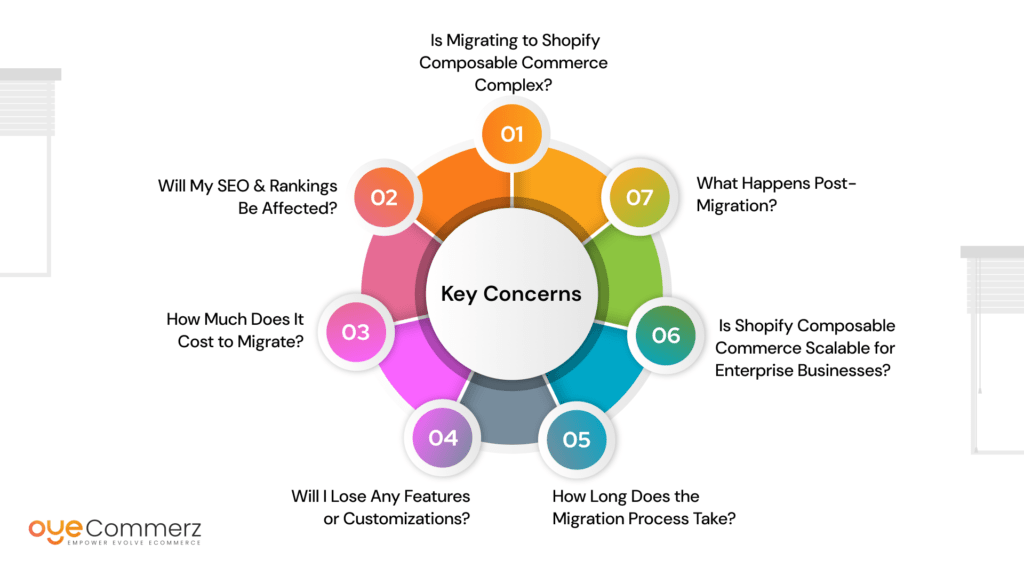
Transitioning from Magento or BigCommerce to Shopify Composable Commerce is a significant decision, and businesses often have concerns about the migration process, costs, and potential disruptions. Below, we address the most common questions to help you make an informed decision.
1. Is Migrating to Shopify Composable Commerce Complex?
- Many businesses worry about data loss, SEO disruptions, or integration issues.
- With expert migration partners like OyeCommerz, the process is smooth, ensuring that all product data, customer records, and order history are transferred securely.
- Shopify’s modular architecture allows for plug-and-play integrations, reducing the need for extensive backend customization.
2. Will My SEO & Rankings Be Affected?
- SEO preservation is a top priority during migration.
- Shopify Composable Commerce supports 301 redirects, structured data, and metadata preservation to maintain search rankings.
- Faster page speeds and mobile optimization help improve SEO performance post-migration.
3. How Much Does It Cost to Migrate?
- Magento requires ongoing development and maintenance, leading to high costs.
- BigCommerce charges premium fees for enterprise scalability.
- Shopify Composable Commerce eliminates unnecessary costs by providing a scalable, cost-efficient solution.
- Migration costs depend on store complexity, but with OyeCommerz, businesses get a transparent, optimized migration strategy with no hidden fees.
4. Will I Lose Any Features or Customizations?
- Shopify’s modular system allows businesses to integrate best-in-class solutions (e.g., headless CMS, AI-powered search, dynamic pricing).
- Unlike Magento, which requires extensive coding, Shopify’s pre-built integrations and APIs offer greater flexibility without complex development work.
5. How Long Does the Migration Process Take?
- The timeline depends on the size of your store and complexity.
- Small and mid-sized stores can migrate in a few weeks, while larger stores may take 1-2 months with customizations.
- With OyeCommerz, we ensure minimal downtime, keeping your store operational during the transition.
6. Is Shopify Composable Commerce Scalable for Enterprise Businesses?
- Absolutely! Shopify Composable Commerce is built for growth, offering:
Cloud-based hosting with unlimited bandwidth
Headless commerce support for omnichannel selling
Advanced AI-driven personalization & automation tools
Global scalability with multi-storefront capabilities
7. What Happens Post-Migration?
- Once your store is live, OyeCommerz provides ongoing support, including:
- Performance optimization
- Custom feature enhancements
- Training for your team on Shopify’s ecosystem
If your business is struggling with high costs, slow updates, or limited scalability on Magento or BigCommerce, then Shopify Composable Commerce is the right move. It offers a modern, flexible, and cost-effective solution designed for rapid growth and long-term success.
Contact to Migrate your Site to Shopify Now
How to Get Started with Shopify Composable Commerce
Now that you understand the benefits of Shopify Composable Commerce and why brands are migrating from Magento and BigCommerce, the next step is to take action. Transitioning to a modern, scalable, and modular eCommerce platform doesn’t have to be overwhelming—especially with the right strategy and expert support.
Step 1: Assess Your Current eCommerce Setup
Before migrating, evaluate your existing Magento or BigCommerce store:
What challenges are you facing? (Slow performance, high maintenance costs, lack of flexibility)
Which features do you want to keep or improve?
Are there specific third-party integrations essential for your business?
Understanding these factors will help ensure a smooth transition to Shopify Composable Commerce.
Step 2: Plan Your Migration Strategy
To minimize risks and disruptions, having a structured migration plan is crucial. This includes:
🔹 Mapping out data migration (products, customers, orders, content, SEO settings).
🔹 Identifying required Shopify integrations for payments, fulfillment, and marketing.
🔹 Selecting the right Shopify theme or developing a custom design.
Step 3: Choose the Right Shopify Plan & Tech Stack
Shopify offers different plans based on business needs:
- Shopify Advanced & Shopify Plus for high-growth brands needing enterprise-level features.
- Composable tech stack with modular solutions such as:
Headless CMS for dynamic content management.
AI-powered search & recommendations for personalization.
Flexible checkout & payment solutions to enhance customer experience.
Step 4: Execute Migration with OyeCommerz
Instead of handling the migration yourself, work with OyeCommerz, a trusted Shopify migration expert. We ensure:
🔹 Seamless Data Migration – No data loss, broken links, or SEO ranking drops.
🔹 Custom Store Setup – Implement Shopify Composable Commerce with the right integrations.
🔹 Quality Assurance & Testing – Performance optimization before going live.
Step 5: Post-Migration Optimization & Growth
Once your store is live on Shopify Composable Commerce, ongoing improvements will maximize results:
Performance tracking & analytics for data-driven decisions.
A/B testing & CRO strategies to enhance conversions.
Marketing automation & customer engagement to drive sales.
Start Your Shopify Composable Commerce Journey Today!
Whether you’re a small business or an enterprise brand, Shopify Composable Commerce offers the agility and performance you need to succeed in today’s competitive eCommerce landscape.
Conclusion
The eCommerce landscape is evolving rapidly, and businesses that want to stay ahead must adopt solutions that offer flexibility, scalability, and cost efficiency. Traditional monolithic platforms like Magento and BigCommerce, while once industry leaders, struggle to keep up with the demands of modern digital commerce. This is why an increasing number of brands are migrating to Shopify Composable Commerce—a modular, API-driven solution that empowers businesses to build a customized and future-ready eCommerce ecosystem.
Key Takeaways: Why Shopify Composable Commerce is the Best Choice
Modular & Flexible: Customize your store by integrating the best tools and services for your specific needs.
Faster Time-to-Market: Reduce development time with pre-built integrations and Shopify’s low-code ecosystem.
Lower Total Cost of Ownership: Eliminate high development and maintenance costs associated with Magento and BigCommerce.
Seamless Scalability: Expand effortlessly without worrying about infrastructure constraints.
Enhanced Security & Compliance: Shopify ensures PCI compliance, fraud protection, and automatic security updates.
Optimized Performance & SEO: Faster page loads, mobile optimization, and built-in SEO tools help drive more traffic and conversions.
Ready to Migrate? Let OyeCommerz Handle Your Transition
Migrating from Magento or BigCommerce to Shopify Composable Commerce is a game-changing decision, but it doesn’t have to be overwhelming. OyeCommerz specializes in seamless migrations, ensuring a smooth transition with minimal disruptions to your business.
Frequently Asked Questions
In 2025, brands are rapidly shifting from Magento to Shopify’s Composable Commerce due to the demand for faster development cycles, lower total cost of ownership, and the need for greater scalability. Shopify’s modular architecture allows businesses to integrate best-of-breed tools, reducing reliance on heavy, monolithic platforms like Magento.
Shopify’s Composable Commerce outperforms BigCommerce by offering a more agile tech stack, enhanced flexibility through headless integrations, and robust APIs for seamless third-party connections. This empowers brands to create custom experiences without backend limitations.
Top advantages include faster time-to-market, easier A/B testing, cost-effective scaling, enhanced customer experience, and access to a thriving app ecosystem. Shopify’s modular system allows brands to innovate without overhauling their entire infrastructure.
Yes, migrating to Shopify in 2025 is worth it for most brands aiming for digital agility. Unlike Magento and BigCommerce, Shopify enables rapid innovation through its composable commerce model, which is more future-proof and aligned with modern customer expectations.
While migration involves planning, it is streamlined through Shopify’s extensive partner network and migration tools. Brands typically experience reduced downtime and improved performance post-migration, making the shift a smart long-term investment.

